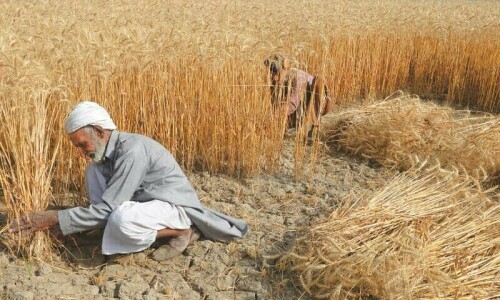 WASHINGTON, April 1: At the Nato summit, which begins in Bucharest on Wednesday, Russian President Vladimir Putin is expected to offer an alternative route for supplying US and Nato troops in Afghanistan.
WASHINGTON, April 1: At the Nato summit, which begins in Bucharest on Wednesday, Russian President Vladimir Putin is expected to offer an alternative route for supplying US and Nato troops in Afghanistan.
The proposal, if accepted, will change the course of the war in Afghanistan and will also have far-reaching consequences for Pakistan as Nato’s 43,000 troops in Afghanistan rely heavily on supplies transported via Pakistan.
Diplomatic sources in Washington told Dawn that Russian and Nato diplomats have already held a series of “productive and successful” talks on a plan that would allow non-military material – such as clothing, food and petrol – to cross Russia by land.
The plan, however, could later be expanded to include ammunition and light weapons as well, the sources said.
Russia’s new ambassador to Nato Dmitri Rogozin played a key role in selling this plan to the members of this US-led alliance, telling them that this will be a reliable alternative route free of violence and political troubles.
While America’s European allies have shown great interest in the proposal, the Americans are still reluctant as they do not want to bring Russia back to a region from where it was forcibly ousted in 1989, after battling Afghan freedom fighters (now Al Qaeda and Taliban militants) for almost 10 years.
Despite Washington’s reluctance, the Nato has held intensive talks with Russian officials on the precise routes to be used and hopes to reach agreement at this week’s summit in Bucharest.
If approved by the summit, the supplies can begin as soon as Nato wants as the Russians already have a functioning route passing through Russia, Kazakhstan and Uzbekistan.
Under the proposed agreement, Russia and the Collective Security Treaty Organisation, a military alliance of former Soviet republics, will jointly guarantee an interrupted supply of essential goods to the Nato forces.
Western diplomatic sources in Washington told Dawn that Nato sees the proposed route as a good alternative for supplies going through Pakistan which faces political uncertainty and may not be a reliable route for long.
The Pakistan route, according to these sources, passes through the Taliban-infested tribal zone and has become increasingly dangerous. Last Sunday, militants blew up a convoy of 36 oil tankers meant for US forces in Afghanistan.
Russian diplomats promoting their proposal also have underlined a so-called “crisis of trust” between the United States and Pakistan, where the new government plans to engage militants in a dialogue opposed by Washington.
They also argue that Russia has always had a strong interest in seeing the Nato mission in Afghanistan succeed because Moscow wants to prevent Muslim extremists enter the former Soviet republics.
But there are others in Washington who warn that an attempt to disassociate Pakistan from any plan for Afghanistan may have dangerous consequences.
In an article published on the eve of the Nato summit, Karl F. Inderfurth, a former US assistant secretary of state for South and Central Asian affairs, describes Pakistan as “one country that can make or break (Nato’s) mission” in Afghanistan.
He notes that Nato’s Secretary General Jaap de Hoop Scheffer has promised to visit Islamabad as soon as the new Pakistan government is in place.
“After Bucharest there is no better destination to reinforce Nato’s Afghan mission,” says Mr Inderfurth while backing the proposed visit.
Mr Inderfurth urges Nato leaders to work on a “new compact” that addresses Afghanistan and Pakistan’s political, economic and security concerns and seeks to neutralise regional and great power rivalries.
To attain this, he proposed an UN-sponsored, a high-level conference of all Afghanistan’s neighbours and concerned major powers for talks on a multilateral accord that addresses Pakistan’s concerns about developments in Afghanistan.
The proposed accord should recognise Afghanistan’s borders with Pakistan, pledge non-interference in Afghanistan’s internal affairs, recognise Afghanistan as a permanently neutral state and establish a comprehensive international regime to remove obstacles to the flow of trade across Afghanistan.
Mr Inderfurth also warns that any large-scale outside military intervention in Pakistan’s tribal areas would be disastrous for the Pakistani state and US interests.
Instead, he urges working with Pakistan’s new leadership to integrate the tribal region into the Pakistani political system and provide substantial assistance to build up their economy and social infrastructure.














































Dear visitor, the comments section is undergoing an overhaul and will return soon.